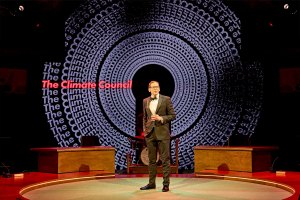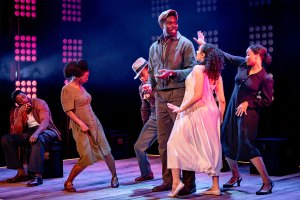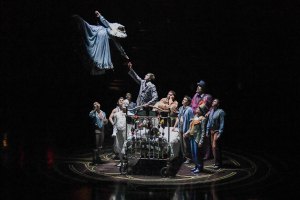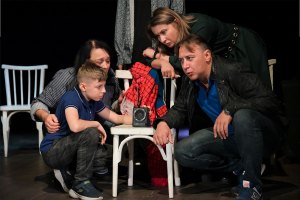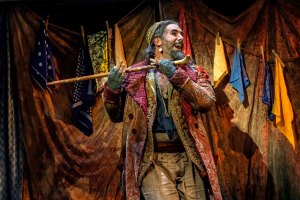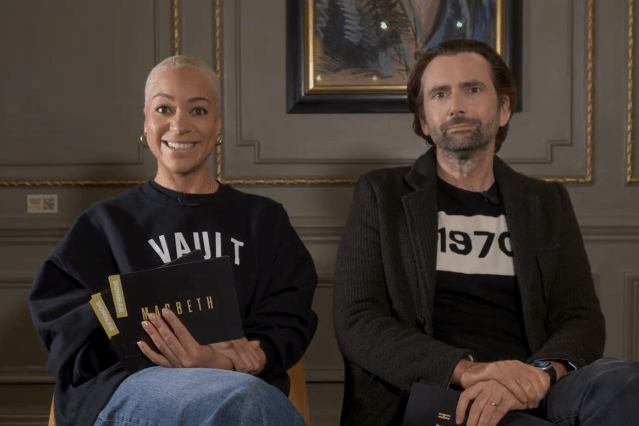887 (Edinburgh International Conference Centre)
‘A beguiling show, full of ultra-pleasing theatricality’
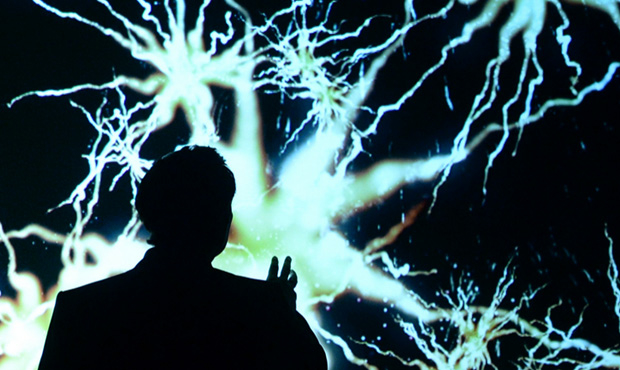
Robert Lepage‘s 887 is a madeleine of a show; a slow stroll down Memory Lane. Canadian auteur Robert Lepage looks at the connection between personal and collective memory, between individuals and history, by taking us back to his own childhood home: a Quebec apartment block, 887 Murray Avenue.
Onstage, it’s a huge doll’s house, maybe eight or nine foot tall, and impeccably detailed: the toy theatre of your childhood dreams. Every balcony has wrought-iron railings and little lights illuminate the porch. In the windows, tiny Sims-like figures go about their business, as Lepage introduces his neighbours. His father’s taxi pulls up outside, gliding in on tracks, Nancy Sinatra playing on the car radio.
The sixties were a time of political upheaval in Quebec. The FLQ – Front de Libération du Quebec – was pushing for sovereignty and bombings, kidnappings and killings were commonplace. For Lepage, the lived history is swirled up with his own: as the FLQ manifesto was read out on television, his grandmother died. She had lived with the family as Alzheimer’s took hold.
In the present – or rather, in 2010 – Lepage is struggling with his memory; trying to learn a poem for a gala marking the 40th anniversary of independence, La Nuit de La Poesie. He enlists the help of an old friend, now working on ‘cold cuts’ – pre-pared obituaries. Lepage wonders if he might see his own; the way his career will be remembered.
887 glides smoothly through time and place, artfully constructing a cloud of associations as it goes. How, Lepage asks, does lived experience crystallise into history? What gets remembered and what forgotten? How might the world remember each of us? With an obit or a statue, a gravestone or a gala? Or with nothing at all, nothing more than a small salute of tears cried in private?
Lepage never ties everything together, preferring that cloud to anything more concrete. It shares a lot with Karl Ove Knaussgard’s autobiographical series, My Struggle, in its high-definition memories, ordered by ideas. The personal and the political glide past one another, brushing shoulders as they go: a child’s paper round runs into an armed solider; an argument next door drowns out a politician’s speech.
Even if you don’t come away with fresh understanding of history and memory, it’s a beguiling show, full of ultra-pleasing theatricality. As a child, Lepage used to play shadow puppets – just as cavemen did around campfires – and his adult theatre retains the same quality: so fluid and free-form it can feel immaterial.
He’s often described as one of theatre’s magician and his doll’s house is a box of tricks, constantly refolding itself into new locations: his kitchen, a neon-flushed diner, the front seat of that taxi. Models too are inherently delightful – and Lepage’s stagecraft, his use of miniature steadycams and projections, can be both dazzling and breathtaking. It’s so entrancing a watch, in fact, that it makes your mind go mushy. Only afterwards do you realise how little it leaves behind, as ephemeral as a memory. But then, maybe, that’s the point…
887 runs at the Edinburgh International Conference Centre until 23 August.



